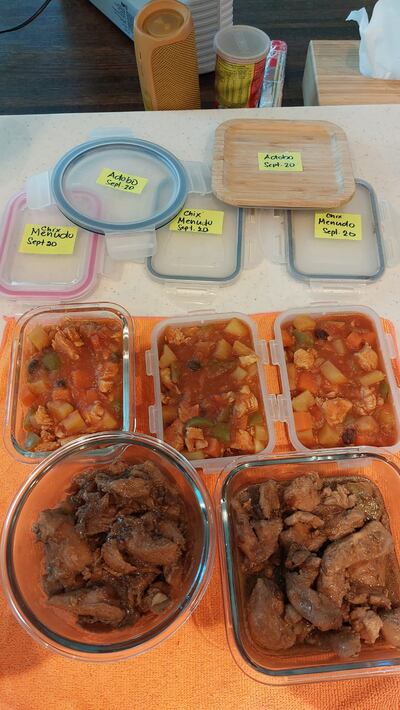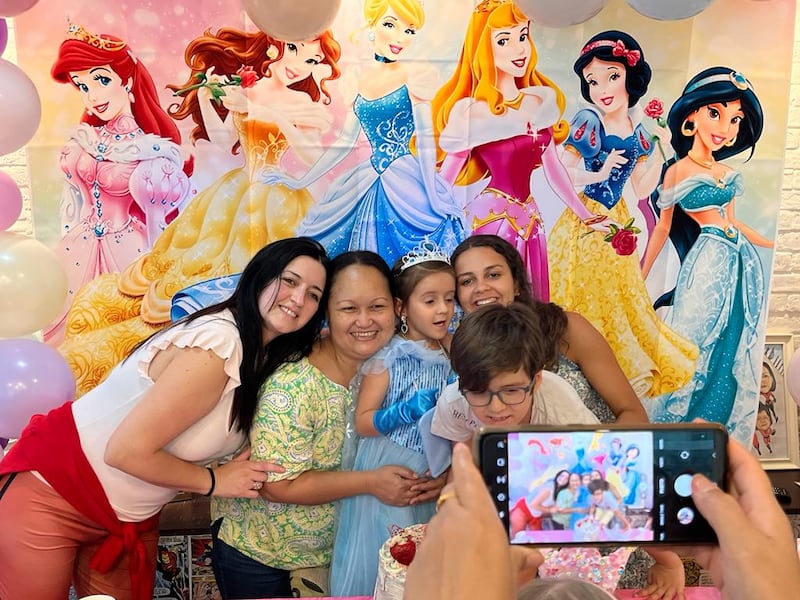The luscious aroma of chicken adobo engulfs the kitchen of a two-bedroom apartment in Dubai Marina. Cherelyn Gesalan, 50, is cooking the Filipino staple, taking pictures for me as she goes.
“I only use Datu Puti soy sauce and vinegar, no other brand,” she tells me, referencing the condiment manufacturer that is a household name in the Philippines. Cherry, as her friends and family call her, has lived and worked outside of her home country since 1997.
She isn't a chef, but cooking is something of a coping mechanism whenever she feels homesick, and Cherry banks on the nostalgic charm of her favourite Filipino dishes. But her proclivity towards familiar flavours has also been serving a different purpose.
Cultural exchange
The fragrant adobo she's preparing is a regular addition to the school lunch boxes of Nacho, six, and Luna, four, and “it has always been like that”, declares Cherry. The two children aren't hers and they aren't even Filipino, but she's been their nanny all their lives.

“They really love Filipino food,” she says.
It's not just Nacho and Luna, either; Cherry says their parents, Silvina and Diego Meneghetti, who both work at Emirates, are also fond of South-East Asian cuisine. After six years with the Argentinian-Brazilian family, Cherry has introduced them to an array of Filipino dishes, from the now mainstream adobo and lumpia to more traditional tinola and afritada.
Silvina's favourite is ginataang bilo bilo, a coconut milk soup with sticky rice balls and sweet potatoes.
Filipino staples aside, every meal Cherry serves to the family is a poignant cultural mishmash, even if some dishes are not intuitive for her. Cherry is just one of tens of thousands of Filipinos who work as domestic helpers in a UAE household. “The Meneghetti family treat me like their own. They are open-minded and very respectful,” she says.
This dynamic is critical in the organic cultural exchange, she says, as Cherry can stay in touch with her roots with no inhibitions while working for and living with them.

During birthday parties and gatherings with other non-Filipino guests, Cherry's tray of stir-fried pancit is the culinary star of the show, she says proudly.
Perhaps it helps that Filipino culture and cuisine have Hispanic influences, which also span Argentinian and Brazilian societies. While Cherry has worked for other families – from Kuwaiti, Pakistan, China and Denmark – she finds working for Latinos the easiest because of the cultural similarities.
However, even for nannies who work with families from different backgrounds, the cultural exchange is clearest when it comes to food.
Susan Bolo, 55, nanny of Ali and Maria in the Emirati-Indian Al Marashis household, says: “One time I encouraged Ali to try puto [Filipino rice cake], and he really loved it,” she says.
Since then, Bolo has introduced the siblings to other local snacks and says they often knock on her door asking for them. Puto aside, she has introduced children to piaya, a thin and flaky flatbread with a sweet filling; and popular Filipino crackers Skyflakes.
Indelible impact
Food, it seems, truly brings people together, as evidenced by Gesalan and Bolo's experiences with their non-Filipino employers. However, the fostering of cultural understanding in such households often goes beyond what's served at the dinner table.
Hams Saleh, an Egyptian content creator in Dubai, recalls growing up with her Filipino nanny, Juliet Balmaceda. “She was like a third parent to me and my sister,” she says.
Some of Saleh's fondest memories with Balmaceda involve food. “She learnt how to cook Egyptian food, but she would also cook Filipino dishes for us,” she says. “Pancit remains one of my favourite dishes. Growing up, I actually liked it more than any of the Egyptian dishes we would have every day.”
Saleh says it was “really interesting” to get glimpses of Balmaceda's culture through the years. Their interaction went well beyond food, she explains. “We even had a thing where I would teach her Egyptian words, and she would teach me Tagalog. She would tell us stories about her family in the Philippines, and we would enjoy listening to them.”
At one point, Saleh's family even met some of Balmaceda's relatives when they visited the UAE, allowing them to bond even more.
In hindsight, Saleh says Balmaceda's impact on her life is truly indelible. She was six when the Filipina nanny joined the household and became an integral part of the family for 18 years.
“It was very emotional for us when Juliet was leaving, but she eventually had to go back to the Philippines. I will never forget her.”






